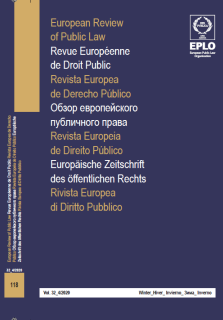
Building a European Social Security System:
Collaboration and Administrative Justice in the Posting of Workers
in the European Union
Lecturer of Administrative Law at the Universidad Autónoma of Madrid (Spain), monica.dominguez@uam.es
This normative and jurisprudential study seeks to examine, with a focus on legal protection and administrative justice, the European system for the coordination of social security system and the posting of workers within the European Union as provided for in European Union legislation and the problems arising from the transnational acts issued in this context in relation to effective legal remedy. More specifically, this study aims to identify the legal order that is applicable according to EU Law, bearing in mind that we are looking at a legal relationship involving, at least, two national legal orders (Member State of origin and receiving Member State). The legal and jurisprudential analysis examines the constitutive elements of effective judicial protection and the procedural and administrative collaboration model in the exchange of information and knowledge, as well as the resolution mechanisms in case of disagreement between national administrations, in the broader context of cooperation and assistance instruments of the Internal Market: the means of recourse available to challenge resolutions on recognition (before the receiving State or the State of origin) and, in general, on the information and administrative cooperation for the protection of third-party rights.
Cette étude normative et jurisprudentielle vise à examiner, en mettant l’accent sur la protection juridique et la justice administrative, le système européen de coordination des systèmes de sécurité sociale et de détachement des travailleurs au sein de l’Union européenne tel que prévu par la législation de l’Union européenne, ainsi que les problèmes découlant des actes transnationaux adoptés dans ce contexte en ce qui concerne un recours juridique effectif. Plus spécialement, cette étude vise à identifier l’ordre juridique applicable selon le droit de l’Union européenne, en gardant à l’esprit que nous examinons une relation juridique impliquant, au moins, deux ordres juridiques nationaux (Etat membre de provenance et Etat membre d’accueil). L’analyse juridique et jurisprudentielle montre les éléments constitutifs d’une protection judiciaire efficace et le modèle de collaboration procédurale et administrative dans l’échange d’informations et de connaissances, ainsi que les mécanismes de résolution en cas de désaccord entre les administrations nationales, dans le contexte plus large des instruments de coopération et d’assistance du marché intérieur: les moyens de recours disponibles pour contester les résolutions sur la reconnaissance (devant l’Etat d’accueil ou l’Etat de provenance) et, en général, sur l’information et la coopération administrative pour la protection des droits des tiers.
*This study has been elaborated in the context of the project “Relaciones jurídicas transnacionales en el mercado interior y justicia administrativa” [Transnational legal relations in the internal market and administrative justice] (DER2017-84500-P), Ministerio de Ciencia, Innovación y Universidades [Ministry of Science, Innovation and Universities].





















